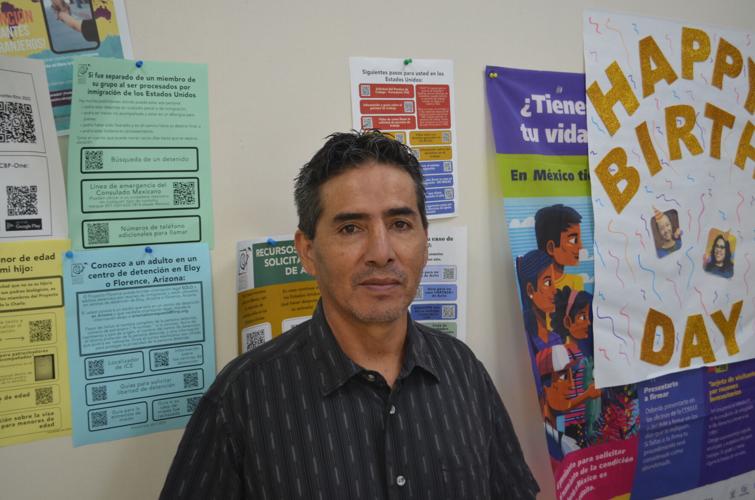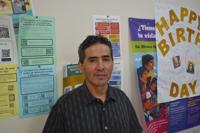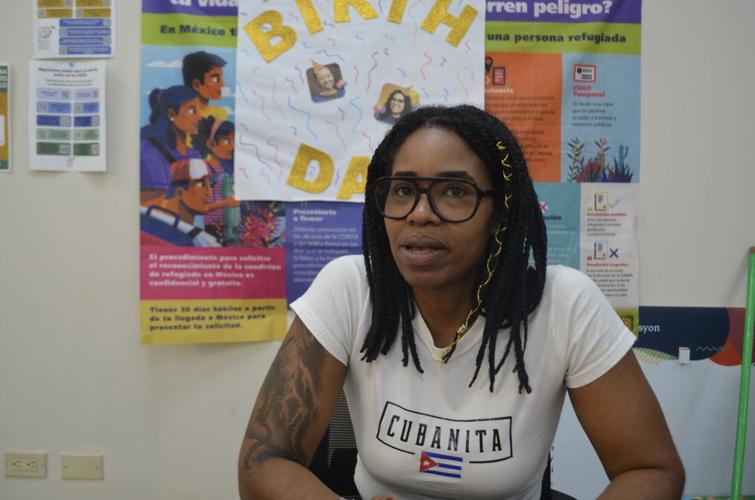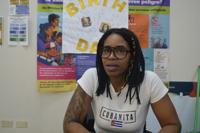
Diego León, 61, shares about his journey from Ecuador to Mexico and his time spent at the Kino Border Initiative shelter in Nogales, Sonora. (César Barrón / CALÓ News)
Nogales, Sonora – Diego León hasn't seen his son for nine years. Originally from Quito, Ecuador, the 61-year-old arrived in Nogales, Sonora on Jan. 18, 2025, hoping to request asylum in the United States. What refugees and migrants like him didn't expect was that President Donald Trump would squash that possibility just two days later when he took office.
Today, León lives in immigration limbo, sustained by faith, the help of the Kino Border Initiative and the longing to be reunited with his 16-year-old son who lives in Kentucky.
His intention was to join his sister, who lives in Oracle, Arizona, a town nearly 50 miles northeast of Tucson, and eventually make his way to his son, whom he hasn’t seen since 2016.
Upon his return to the White House, Trump suspended the asylum process through the CBP One app, which served as an appointment tool for asylum seekers and migrants to obtain authorized entry at eight ports on the southern border with Mexico.
The suspension of the CBP One service became permanent in a matter of months when the government modified its function to be used as a self-deportation tool. In August, a lawsuit was filed against the U.S. government for eliminating the service and notifying migrants and refugees already in the country that their immigration status had changed and that they should leave as soon as possible. This action impacted the immigration cases of countless people.
In preparation for Trump's return and in the months following, several organizations have increased their operations on both sides of the border to support asylum seekers and those whose stay in the U.S. has been interrupted by recent actions.
Among them is Kino Border Initiative, a binational organization with a Catholic focus and a particular mission to promote human mobility in a dignified and respectful manner.
Advocating for 'mobility with dignity' since 2008
According to Yohana Oviedo, the organization’s media and narrative coordinator, their mission to promote dignity in all aspects of migration guides them like a beacon.
The nonprofit has been operating since 2008 in Nogales, Arizona, and Nogales, Sonora, Mexico, a Mexican city where historically a large number of deportees often arrive — either because the U.S. government releases them in this area or because they arrive seeking services like those offered by Kino.

Yohana Oviedo, media and narrative coordinator at Kino Border Initiative, speaks about the organization's programs in support of migrants in Nogales, Sonora. (César Barrón / CALÓ News)
Kino has its shelter and dining room for migrants in Nogales, Sonora, just a few meters from the Mariposa border crossing.
The organization offers various services free of charge:
Legal support in Mexico and the U.S. through Project Florence.
Full-time doctor, psychosocial support and psychology.
Food and shelter services with a capacity of between 100 and 120 people.
On average, the organization serves 80 meals a day, which is approximately a third of what they were averaging last year, according to Oviedo.
That number has decreased because the Mexican government has significantly changed its immigration strategy. According to Oviedo, Mexico now offers migrants a card with financial support of two thousand pesos, buys them bus tickets and sends them to their places of origin.
The current immigration situation in the United States has also prompted the organization to collect new data to inform the border situation. Earlier this month, Kino published a pattern identification survey the organization conducted among 278 people deported between May and July 2025 — 84% of them men — who were being held at a shelter set up by the Mexican federal government in Nogales, Sonora.
Through this survey, they gathered information from those being deported and what they experienced during the process.
What they found was that 44% of the deportees had been living in the United States for more than 10 years and had strong ties, impacting not only the individual but also their family, Oviedo explained. Respondents also expressed negligence and overcrowding in immigration detention centers. “In the surveys, they told us they were kept in small cells, but there were a huge number of people,” she explained.
“One of the most important things about Kino is that it is a refuge and a space where people arrive tired and exhausted, with uncertainty, unknowing, often with fear because it's a city they don't know," said Oviedo.
Migrants at the border hold onto hope
León told CALÓ News he spent a month in the state of Hidalgo, Mexico, and from that point on, he tried to schedule an appointment through the CBP One app. But when he couldn't get one, he moved to Nogales, Sonora. Since the beginning of the year, he has continued to hope that the situation will change.
"My intention has always been to cross into the United States, but legally; otherwise, I would be there already," he said.
León remains in Nogales, Sonora, where he receives food and support through Kino. Because he cannot return to his country due to safety concerns, he’s decided to try to stay in Mexico and request asylum. He recently began the legal process before the Mexican Commission for Refugee Aid with the support of Kino.
During the legal process, he must attend immigration office appointments every 10 days and must avoid leaving Nogales for the process to remain valid. He is currently waiting for his case to be resolved.
César Barrón is an independent reporter covering the transnational communities of Ambos Nogales. He has over 20 years of experience covering the Sonoran communities.

















(0) comments
Welcome to the discussion.
Log In
Keep it Clean. Please avoid obscene, vulgar, lewd, racist or sexually-oriented language.
PLEASE TURN OFF YOUR CAPS LOCK.
Don't Threaten. Threats of harming another person will not be tolerated.
Be Truthful. Don't knowingly lie about anyone or anything.
Be Nice. No racism, sexism or any sort of -ism that is degrading to another person.
Be Proactive. Use the 'Report' link on each comment to let us know of abusive posts.
Share with Us. We'd love to hear eyewitness accounts, the history behind an article.